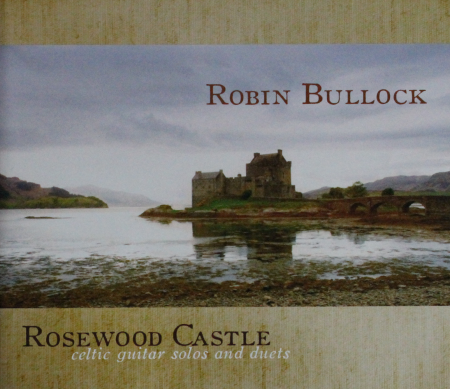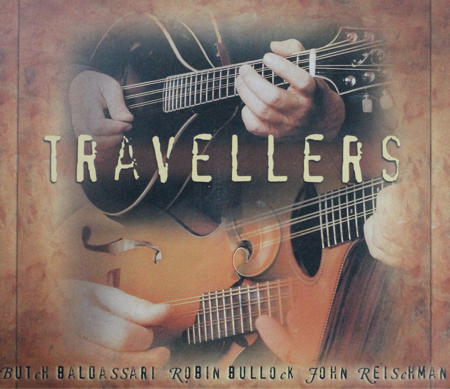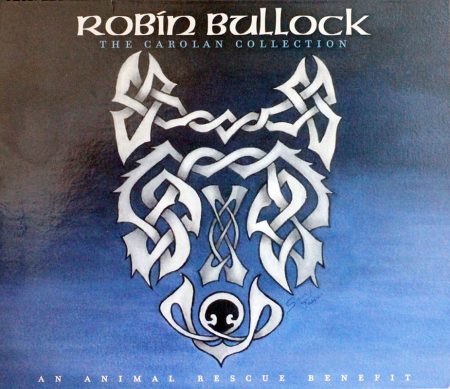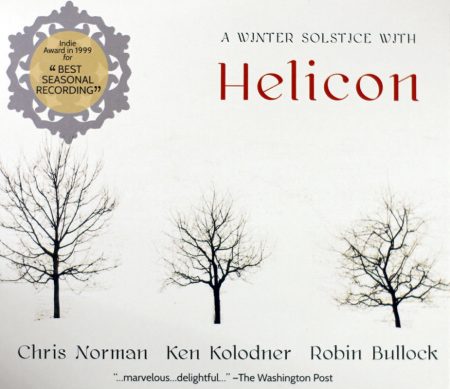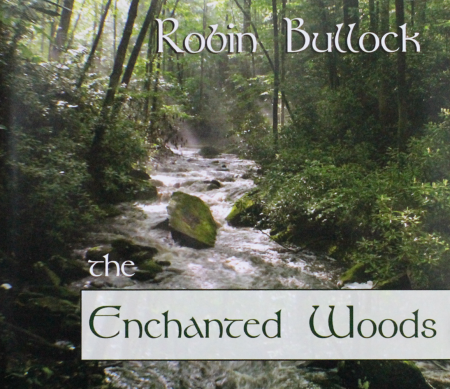Liner Notes
1. Come by the Hills
Robin, solo guitar
Although the original title of this air is “Buachaill ón Éirne” (“The Boy from Ireland” in Irish Gaelic), it has become better-known in recent years as the melody to Canadian poet Gordon Smith’s lyric “Come by the Hills.” This version was inspired by Maine folksinger Gordon Bok’s vocal rendition on his 1975 album Bay of Fundy.
2. Lady Edwards
Robin, solo guitar
A composition of the legendary blind Irish harper Turlough O’Carolan (1670-1738), as are tracks 4, 8 and 11, all of which can be found in Donal O’Sullivan’s definitive book Carolan: The Life, Times and Music of an Irish Harper. The brass-strung Irish harp of Carolan’s day had a hypnotic and magical sound that I believe the steel-string guitar can come very close to capturing. This CD brings my lifetime total of recorded Carolan tunes to 28, if I’m counting accurately…
3. Raglan Road
Robin, guitar / Alex de Grassi, guitar
The day after Alex’s 2006 appearance at le Festival International de Guitare “Les Automnales” in Ballainvilliers, France, I spirited him away into the studio and we jammed on this classic Irish song, creating our own slightly impressionistic version. I’m playing lead on the first and third verses, Alex on the second and fourth.
4. Sir Festus Burke
Robin, solo guitar
(See note to track 2)
5. Southwind
Robin, guitar / Al Petteway, guitar
A favorite Irish waltz. Al also has a beautiful solo version on his 1992 CD Whispering Stones, under the title “The West Wind.”
6. The Savage Wee Beastie / The Limerick Lasses / The Bird in the Bush Robin, guitar / John Doyle, guitar
Irish music’s hardest-driving rhythm guitarist joins me for a set of three reels. I start off with an original named in honor of my cat Thisbe, John takes over with a standard of the Irish session repertoire, and we take it home with another standard, the title of which provides a nice thematic link with the first tune!
7. Les barricades mystérieuses
Robin, solo guitar
A composition for harpsichord by the French Baroque composer François Couperin (1668-1733), who was fond of giving his pieces somewhat bizarre titles. This one translates as “The Mysterious Barricades” or “The Mysterious Boundaries,” and nobody seems to know exactly why (although a number of intriguing theories have been proposed…). In any event, while this piece is often played quickly, I feel that the beauty of the harmonic progression is better served by this more leisurely, meditative tempo. Thanks to the great classical guitarist John Williams for the inspiration.
8. Lady St. John
Robin, solo guitar
(See note to track 2)
9. Coilsfield House
Robin, guitar and 12-string guitar
A composition of Nathaniel Gow (1764-1831), son of renowned Scottish fiddler and composer Niel Gow and a prolific composer and music publisher in his own right. Coilsfield House was the home of Colonel Hugh Montgomerie (1739-1819), the Earl of Eglinton, an enthusiastic patron of Scottish music and dance.
10. Breton-Asturian Set
Robin, cittern / Tony McManus, guitar
This set starts with “Ar Minor,” a traditional song from Brittany, the Celtic region of western France. I learned it from les Frères Morvan, three Breton brothers who sing the old songs of their homeland unaccompanied in a beautifully raw style (thanks for the CD, Judith). Tony and I imitate the call-and-response of traditional Breton singing at the beginning of the track. We follow with two melodies from Asturias, the Celtic region of northwestern Spain, learned from the incredible Asturian band Llan de Cubel: the love song “Coyi d’un artu una flor” (“From the bramble bush I picked a flower”) and the dance tune “La molinera” (“The millerwoman”).
11. Lady Maxwell
Robin, solo guitar
(See note to track 2)
12. Down by the Salley Gardens
Robin, guitar / Steve Baughman, guitar
Steve and I first teamed up in 2002 for the CD Celtic Guitar Summit, discovered we enjoyed playing together, and have toured as a duo whenever possible ever since. Here we join forces for another chestnut of the Irish song repertoire; the tune is traditional and William Butler Yeats wrote the poem “Down by the Salley Gardens,” in his words “an attempt to reconstruct an old song from three lines imperfectly remembered by an old peasant woman in the village of Ballysodare, Sligo, who often sings them to herself.” His version goes:
Down by the salley gardens my love and I did meet, She passed the salley gardens with little snow-white feet.
She bid me take love easy, as the leaves grow on the tree; But I was young and foolish, with her would not agree.
In a field by the river my love and I did stand, And on my leaning shoulder she laid her snow-white hand.
She bid me take life easy, as the grass grows on the weirs; But I was young and foolish, and now am full of tears.
The song upon which Yeats’s poem was based may have been “You Rambling Boys of Pleasure,” which contains similar lyrics but concludes on a somewhat more hopeful note:
And I wish I was in Belfast town and my true love along with me, And money in my pockets to keep us in good company, Liquor to be plenty, a flowing glass on every side, Hard fortune would ne’er daunt me, for I am young and the world is wide.
(As a “salley” is a willow tree, Yeats’s poem may also have crossed the Atlantic and gradually morphed into the American murder ballad “Down in the Willow Garden,” in which the narrator poisons his lover with wine, hurls her corpse into a river, and is preparing to be hanged for the crime in the final verse. The folk process can be a strange thing!)
13. Rebecca’s Hymn
Robin, solo guitar
This ancient Scottish air served as the inspiration for the hymn sung by the character Rebecca in Sir Walter Scott’s novel Ivanhoe. Fiddler Bonnie Rideout tracked down the tune in A Collection of the Gems of Modern Gaelic Song edited by Malcolm C. MacLeod (Glasgow, 1913) and I picked it up from her.



